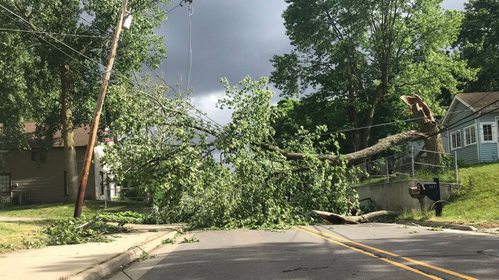The Town has put together a lot of information related to both of these items, including a nice timeline of the various discussions and decisions around the Carrboro Connector Roads policy – this policy has been in place since 1985 and has had many instances where exceptions were made based on the concerns of residents.
The traffic calming process should be simplified
If a resident wants the town to implement traffic calming, the process is currently long, expensive and burdensome to complete. There are ~12 steps, including the requirement for residents to collect signatures from 75% of the surrounding area. The current process also requires the town to spend extensive time and resources on analyzing, designing and measuring various components of the request. Eventually the request can be implemented by council if it meets a long list of criteria.
Since the existing policy was implemented in 1996 around 60-70 requests have been received by the town and only ~17 of these requests have actually resulted in the implementation of traffic calming.
I hope that the town simplifies this process and also allocates budget to quickly and efficiently implement a variety of traffic calming devices when requested as this is one of the ways to ensure safety for everyone who uses a road – drivers, bikers, and walkers.
I’d love to see the town include hard protected bike lanes as a form of traffic calming because the narrowing of streets naturally calms traffic while also enabling bicycles to travel more safely down some of the busier residential roads. Traffic calming doesn’t have to be overly bureaucratic and expensive. Simplifying this process and the options available will lead to safer streets for all.
Connected roads policy
Tonight the town is also revisiting their connected roads policy. The information prepared by the town is great, and the memo from the new Fire Chief is excellent in outlining the issues that arbitrary and capricious road blocks have on the overall safety for a community.
It’s not the first time the Town of Carrboro has asked to review the connected roads policy. The policy was reviewed at the March 10, 2020 council meeting (starts at 59:30) but the requests and ideas from that meeting have not been implemented.
Three years later, we’re still grappling with how to connect roads. Chapel Hill recently adopted a plan that will “ implement a consistent approach to local street connections that uses planning best practices of connecting communities and dispersing traffic”
There’s a growing body of research and peer reviewed studies that look at road connectivity, street design patterns and the impacts on safety, climate, efficiency and racial equity. An excellent place to start is the APA PAS Report 515 (2003), Planning for Street Connectivity. The report quotes Huntersville Planning Director Jack Simoneau,who notes, “Educating people on concepts that say that a) by providing more local access, we can promote safety and efficiency of traffic flow and services, and b) it is beneficial to the natural environment to cluster land development, can be a challenge.”
Fortunately, Carrboro has the Carrboro Connects comprehensive plan to guide our leaders in their decision making related to the Connector Roads policy. The comprehensive plan outlines how Carrboro can measure progress in certain areas – transportation and mobility, climate action and the environment, and economic sustainability. Many of these measurements – reducing vehicle miles traveled, reducing greenhouse gas emissions, increasing connectivity to parks and schools– relate directly to how we connect our streets.
In addition to Chapel Hill, the City of Charlotte has started to better connect its roads and rethink their land use patterns. Carrboro has an opportunity now to rethink the way future Carrboro will be designed – and my hope is it’s one that’s more connected, more accessible, and safer for all residents.

